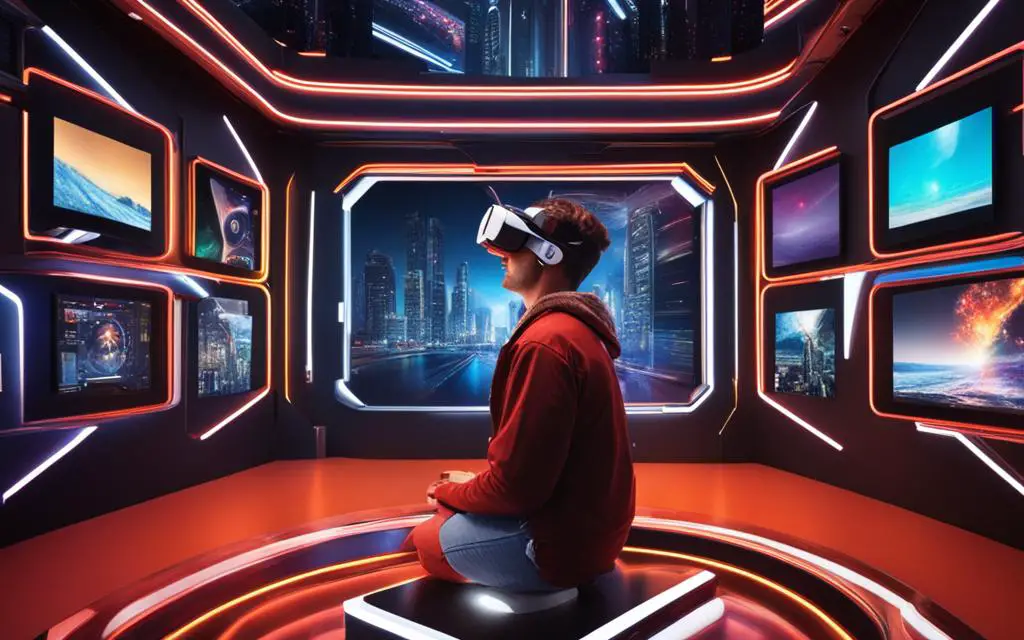Digital marketing is constantly evolving, driven by advances in technology and changes in consumer behavior. In this blog post, we will explore the future of digital marketing and uncover the emerging trends that will shape the industry in the coming years.
We will discuss the rise of artificial intelligence in marketing, the significance of user-generated content, the emergence of immersive experiences, and the importance of enhanced data privacy and personalization. These trends will have a profound impact on how marketers engage with their audience and drive business growth.
The Rise of Artificial Intelligence
Artificial intelligence (AI) is already revolutionizing the field of digital marketing and its influence is set to grow even further in the future. AI-powered tools and algorithms can analyze vast amounts of data to deliver precise customer insights, personalize experiences, and optimize marketing campaigns. Marketers can use AI to streamline their processes, automate repetitive tasks, and make strategic decisions. Machine learning algorithms enable accurate audience targeting, increasing engagement and conversion rates. As AI continues to evolve, it will transform customer interactions, content creation, and data analysis, enabling marketers to create more meaningful connections and drive business growth.
One of the key advantages of AI-powered tools is their ability to analyze customer behavior patterns and predict future actions. By understanding customer preferences and intentions, marketers can tailor their campaigns to provide personalized experiences that resonate with their audience. With AI-powered personalization, brands can deliver targeted content, product recommendations, and offers to each individual, increasing the likelihood of conversion and customer loyalty.
AI can also automate the process of content creation, saving marketers time and resources. From generating written content to designing graphics, AI algorithms can produce creative assets that align with a brand’s voice and style. This enables marketers to focus on strategy and high-level decision making, while leaving repetitive and time-consuming tasks to AI-powered tools. With AI-driven content creation, marketers can maintain consistency, enhance efficiency, and deliver quality content to engage their audience.
| Benefits of AI in Digital Marketing | Examples |
|---|---|
| Enhanced customer insights | AI algorithms analyzing customer data to identify patterns and preferences |
| Personalization at scale | Delivering tailored content and offers to individual customers based on their preferences |
| Automated content creation | AI-generated written content, graphics, and other creative assets |
| Optimized marketing campaigns | Using AI to analyze data and make data-driven decisions for campaign optimization |
In conclusion, the rise of artificial intelligence in digital marketing presents exciting opportunities for marketers to enhance customer experiences, improve campaign effectiveness, and drive business growth. By leveraging AI-powered tools and algorithms, marketers can analyze data, personalize content, and automate tasks, enabling them to create impactful marketing campaigns that resonate with their target audience. As AI continues to evolve, it is essential for marketers to stay updated with the latest trends and developments to stay ahead in the ever-changing digital landscape.
The Growing Significance of User-generated Content
User-generated content (UGC) has become a powerful force in digital marketing and its importance will only increase in the future. UGC, such as customer reviews, testimonials, and social media posts, builds trust, authenticity, and social proof. Consumers rely on UGC to inform their purchase decisions. Marketers will leverage UGC to strengthen their brand’s credibility and reach a wider audience. By encouraging customers to create and share content, brands can amplify brand exposure and foster a sense of community and engagement. Utilizing UGC through influencer marketing and user-centric campaigns will be essential strategies to resonate with consumers and enhance brand loyalty.
The Power of Customer Reviews
One of the most valuable forms of UGC is customer reviews. Research shows that 92% of consumers read online reviews before making a purchase decision. Positive reviews not only boost brand credibility but also influence consumer behavior. Brands that actively encourage and promote customer reviews can establish a strong online reputation and gain a competitive edge. Moreover, by responding to customer reviews, brands demonstrate their commitment to customer satisfaction and build trust with potential buyers.
“User-generated content is a game-changer for brand authenticity. When consumers see real people sharing their experiences with a product or service, it creates a sense of trust and credibility that traditional marketing cannot always achieve.”
The Impact of Social Media UGC
Social media platforms have become a hub for user-generated content, with consumers sharing their experiences, thoughts, and opinions about brands and products. Marketers can tap into this vast pool of user-generated content to gain invaluable insights into consumer preferences and trends. By monitoring social media conversations and engaging with users, brands can create meaningful connections, address customer concerns, and uncover opportunities for product improvement or new offerings.
Moreover, by encouraging customers to create and share their own content using branded hashtags or contests, brands can generate buzz, increase brand visibility, and foster a sense of community. User-generated content on social media has the potential to go viral, reaching a wider audience and boosting brand exposure in an organic and authentic way.
Building Brand Trust and Loyalty
Today’s consumers are increasingly skeptical of traditional advertising and prefer content that comes from their peers. User-generated content plays a key role in building brand trust and loyalty. When consumers see real people sharing their positive experiences with a brand, they are more likely to trust and connect with that brand. By incorporating UGC into their marketing strategies, brands can create a sense of authenticity and relatability, fostering long-term relationships with their customers.
In conclusion, user-generated content is a powerful tool that marketers can leverage to build brand credibility, engage with their audience, and drive business growth. By tapping into the authentic voices of their customers, brands can create meaningful connections that resonate with consumers and foster brand loyalty. As the importance of UGC continues to grow, marketers must embrace and prioritize user-generated content as a fundamental pillar of their digital marketing strategies.
The Emergence of Immersive Experiences
You’re about to embark on a journey into the exciting world of immersive experiences in digital marketing. As technology continues to evolve, virtual reality (VR) and augmented reality (AR) are taking center stage, transforming the way consumers engage with brands. These immersive technologies provide captivating and interactive experiences that blur the boundaries between the digital and physical worlds, creating unique opportunities for consumer engagement and innovative advertising campaigns.
Imagine being able to transport your audience into a virtual showroom where they can explore your products in a lifelike environment. With VR, you can do just that. By creating immersive experiences, you can captivate your audience and leave a lasting impression. VR not only offers a novel way to showcase your products but also allows consumers to interact with them, enhancing their purchase decision-making process.
AR, on the other hand, overlays digital information onto the real world, opening up a world of possibilities for marketers. From virtual try-on experiences for fashion brands to interactive guides for home improvement products, AR allows consumers to visualize how products will fit into their lives. By incorporating AR into your marketing strategies, you can deepen consumer engagement, increase brand awareness, and drive conversions.
To give you a clearer picture of the impact of immersive experiences, let’s take a look at the table below:
Benefits of Immersive Experiences in Digital Marketing Examples Enhanced consumer engagement Virtual product demonstrations Innovative advertising campaigns AR-powered interactive billboards Increased brand awareness VR-powered brand experiences Improved customer experiences AR-guided in-store experiences
As you can see, immersive experiences offer a wide range of benefits for digital marketers. By harnessing the power of VR and AR, you can create memorable brand experiences, improve customer satisfaction, and differentiate yourself from the competition. As technology continues to advance, it’s time to embrace the emergence of immersive experiences and unlock their limitless potential in your digital marketing strategies.
Now that we’ve explored the impact of immersive experiences, let’s move on to the next section, where we’ll delve into the importance of enhanced data privacy and personalization in digital marketing. But first, take a moment to visualize the possibilities with this image:

Table: Benefits of Immersive Experiences in Digital Marketing
Enhanced Data Privacy and Personalization
In an era where data collection and usage are at the forefront of digital marketing strategies, enhanced data privacy and personalization have become crucial considerations. As consumer demand for transparency and protection of their personal information grows, marketers must navigate the delicate balance between personalization and respecting privacy boundaries.
One key aspect of enhanced data privacy is the implementation of stricter regulations. Governments and regulatory bodies around the world are enacting laws to safeguard consumer data and hold companies accountable for their data handling practices. Marketers must stay informed about these regulations, such as the General Data Protection Regulation (GDPR) in the European Union, and ensure compliance to maintain trust with their audience.
At the same time, personalization remains a fundamental strategy to engage and connect with consumers. By leveraging technologies such as contextual targeting and permission-based data usage, marketers can create tailored experiences that resonate with their target audience. Contextual targeting allows marketers to deliver relevant content based on a user’s real-time behavior or current context, providing personalized experiences without relying on extensive personal data. Permission-based data usage ensures that consumers have control over how their data is collected and used, promoting transparency and building trust.
Examples of Contextual Targeting:
- A travel website displays hotel deals based on the user’s location and browsing history.
- An e-commerce platform recommends products based on the user’s previous purchases and browsing behavior.
- A streaming service suggests personalized playlists based on the user’s listening history and preferences.
By integrating enhanced data privacy measures and strategic personalization approaches, marketers can create meaningful and relevant experiences for their audience while respecting their privacy. Finding this delicate balance will be essential to succeed in the evolving landscape of digital marketing.
| Data Privacy | Personalization | Contextual Targeting | Permission-based Data Usage |
|---|---|---|---|
| Stricter regulations | Tailored experiences | Deliver relevant content | Consumer control over data |
| Transparency and trust | Resonate with the audience | Real-time behavior targeting | Building trust through transparency |
| Compliance with GDPR | Meaningful connections | Relevant recommendations | Respecting privacy boundaries |
AI-Powered Content Creation
Artificial intelligence (AI) is revolutionizing the way we create content. With the help of AI-powered tools and algorithms, marketers can automate repetitive tasks and make data-driven decisions to streamline their content creation process. AI is not here to replace human creativity, but rather to serve as a valuable asset that saves time, ensures consistency, and improves accuracy.
One area where AI excels in content creation is in generating written content. AI algorithms can analyze data, identify trends, and produce relevant and engaging articles, reports, and social media posts. This automation allows marketers to focus more on strategy and creativity, as AI takes care of the heavy lifting. However, it’s essential to exercise quality control to ensure that AI-generated content aligns with the brand’s voice and values.
AI can also assist in graphic design by generating custom graphics based on specified parameters and data. This capability is particularly useful for creating visual content for social media, presentations, and infographics. By utilizing AI, marketers can produce visually appealing and engaging graphics that align with their brand identity.
“AI is not just a futuristic concept; it is becoming a game-changer in content creation.”
Furthermore, AI can compose music and create artwork. This opens up new possibilities for marketers in terms of multimedia content and enhancing brand experiences. By incorporating AI-generated music and artwork into their campaigns, marketers can create unique and captivating experiences for their audience.
AI-powered content creation is an exciting development in digital marketing. By leveraging AI’s capabilities, marketers can automate tasks, make data-driven decisions, and produce high-quality content that engages their audience. However, it’s crucial to strike a balance between AI-generated content and human creativity to ensure authenticity and maintain the brand’s voice throughout the content creation process.

The Benefits of AI-Powered Content Creation:
- Saves time by automating repetitive tasks
- Improves accuracy and consistency in content creation
- Enables data-driven decisions based on AI analysis
- Streamlines graphic design processes
- Enhances multimedia content with AI-generated music and artwork
Embracing AI-powered content creation can help marketers stay ahead in a rapidly evolving digital landscape where the demand for high-quality and personalized content is continuously increasing.
| Benefits of AI-Powered Content Creation | Advantages |
|---|---|
| Saves time | Automation of repetitive tasks frees up time for strategic planning and creativity |
| Improves accuracy and consistency | AI algorithms ensure content is generated with precision and adheres to brand guidelines |
| Enables data-driven decisions | AI analysis provides insights that inform content creation strategies and optimizations |
| Streamlines graphic design processes | AI-powered tools can generate custom graphics based on specified parameters and data |
| Enhances multimedia content | AI-generated music and artwork add a unique touch to multimedia campaigns |
Embracing Diversity and Inclusion
The marketing landscape is evolving, and diversity and inclusion have become more than just buzzwords – they are now essential elements for successful marketing campaigns. By authentically representing diversity and inclusivity in your marketing materials, you can resonate with your audience, build trust, and create meaningful connections. It’s not just about ticking a box; it’s about celebrating the unique perspectives and experiences that each individual brings to the table.
When creating your marketing campaigns, consider the diverse range of people who make up your target audience. Ensure that your visuals and messaging reflect their identities, backgrounds, and experiences. Avoid tokenism and strive for genuine representation. By featuring individuals from different races, ethnicities, genders, ages, abilities, and sexual orientations, you can authentically connect with a broader audience and show that you value and embrace diversity.
“Diversity is about all of us, and about us having to figure out how to walk through this world together.” – Jacqueline Woodson
However, embracing diversity and inclusion goes beyond external representation. It requires fostering an inclusive culture within your organization. Promote diversity in your hiring practices, create a safe and inclusive work environment, and provide opportunities for diverse voices to be heard. By establishing a diverse and inclusive team, you can gain valuable perspectives and insights that will inform your marketing strategies and ensure that they resonate with a diverse audience.
| Benefits of Embracing Diversity and Inclusion in Marketing | Impact |
|---|---|
| 1. Improved brand reputation | People appreciate brands that embrace diversity and inclusion, which can enhance your brand’s reputation. |
| 2. Increased customer loyalty | When consumers see themselves authentically represented in your marketing, they are more likely to feel a connection to your brand and become loyal customers. |
| 3. Expanded market reach | By embracing diversity, you can tap into new markets and reach a wider audience. |
| 4. Innovation and creativity | A diverse team brings together a variety of perspectives and experiences, fostering innovation and creativity in your marketing strategies. |
Embracing diversity and inclusion is not just the right thing to do – it’s also good for your business. By authentically representing your audience, fostering an inclusive culture within your organization, and embracing diversity in your marketing campaigns, you can create powerful connections, build brand loyalty, and drive business success in an ever-evolving marketing landscape.
Conclusion
The future of digital marketing is on the horizon, and it promises to bring forth a landscape filled with exciting opportunities. As technology continues to evolve and consumer behaviors shift, it is crucial for marketers to stay ahead of the curve and adapt to the changing environment.
The rise of artificial intelligence (AI) is set to revolutionize the industry. With AI-powered tools and algorithms, marketers can gain valuable customer insights, personalize experiences, and optimize their marketing campaigns. This will ultimately drive business growth and help establish stronger connections with their target audience.
In addition, user-generated content (UGC) will continue to play a vital role in digital marketing. By leveraging customer reviews, testimonials, and social media posts, brands can build trust, enhance brand credibility, and reach a wider audience. Creating immersive experiences through virtual reality (VR) and augmented reality (AR) will also become more prevalent, capturing attention and enabling innovative advertising campaigns.
As the digital marketing landscape evolves, data privacy and personalization will become increasingly important. Marketers must adopt ethical data practices while delivering tailored experiences to meet consumer expectations. By embracing diversity and inclusivity in marketing campaigns, brands can resonate with audiences and foster a sense of authenticity.
To thrive in this evolving landscape, marketers must be willing to adapt, embrace emerging trends, and leverage technology to create meaningful user experiences. By doing so, they can drive business growth and unlock the limitless potential that the future of digital marketing holds.
Source Links
- https://www.linkedin.com/pulse/future-digital-marketing-embracing-ever-evolving-landscape-sinha
- https://www.linkedin.com/pulse/mastering-art-digital-marketing-unveiling-trends-2023-alqrinawi
- https://medium.com/@ndmitvns10/the-ever-evolving-landscape-unveiling-the-future-of-digital-marketing-3924616439f8






I will right away take hold of your rss feed as I can not to find your email subscription hyperlink or e-newsletter service.
Do you have any? Kindly allow me realize so that I may just subscribe.
Thanks.